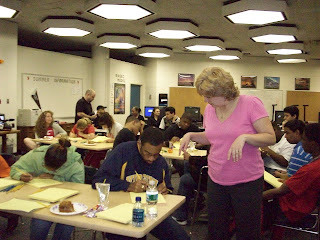
Local author and native Washingtonian George Pelecanos is honorary chair for the 2009 Big Read - D.C. Pelecanos is the author of 15 novels set in and around the District as well as editor for two short story anthologies under the title
D.C. Noir. Most recently, he was a producer, writer, and story editor for the acclaimed HBO dramatic series, "The Wire."
Pelecanos has been a friend of the Big Read - D.C. since he participated in our community partners's meeting to select the 2008 Big Read - D.C. book,
The Great Gatsby by F. Scott Fitzgerald.
As a crime novelist, Pelecanos has a special kinship with Washington, DC area where he grew up, went to school, church, and worked. The road to the first novel was paved with a variety of jobs including linecook, dishwaster, woman's shoe salesman, and bartender. The first novel,
A Firing Offense, brought a small advance but not enough to pay the rent. It did lead to a second novel, a new publisher and a larger advance to live on, plus a film option from Miramax. Options of books don't guarantee films, but they can bring writers some attractive income from Hollywood. His novel
Right as Rain is currently in development with director Curtis Hanson (
LA Confidential, Wonder Boys) and Warner Brothers.
Carson McCullers was no stranger to Hollywood either. She adapted her third novel,
Member of the Wedding (1946) into a stage play. It went to Broadway and then was optioned for a Hollywood film production starring Julie Harris and Ethel Waters. McCullers' other novels --
The Ballad of the Sad Cafe,
Reflections in a Golden Eye, and
The Heart Is a Lonely Hunter--were all optioned and adapted for film.
For the 2009 Big Read - D.C., George Pelecanos will be joining us for the official kickoff Saturday, April 25, the Larry Neal Writers Competition Awards on May 8, and a reading at
Politics & Prose of his new novel,
The Way Home due for release in May. (Stay tuned to this blog for the complete and most up-to-date calendar for the 2009 Big Read - D.C.)
This year's Big Read - D.C. aims to inspire new readers and writers. Each year, the Big Read - D.C. introduces new work by community partners like SpeakeasyDC and DC WritersCorps, as well as D.C. high school student poets and essayists.
For more information about George Pelecanos, visit his website at
www.georgepelecanos.com
Read about our February community partners meeting on the national NEA Big Read blog
http://www.nea.gov/bigreadblog/?p=213.









































